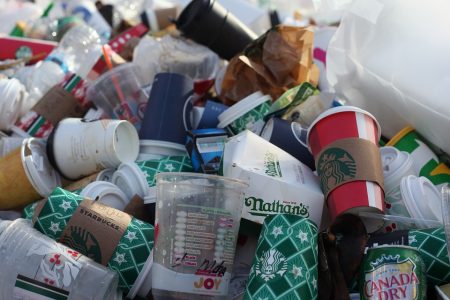
‘Get Toxins Out’ – Legislative update
– CA will soon begin the process of banning the use of toxic PFAS, aka, “forever chemicals” in to-go containers, paper straws, and food wrappers, thanks to AB1200, which passed in Oct. of 2021.
The bill, authored by Assemblymember Phil Ting (D-San Francisco), will also require manufacturers to label cookware that contains toxic chemicals on product handles or coatings, starting Jan. 1, 2024.
Beginning Jan. 1, 2023, manufacturers will also need to make a public list on their websites of chemicals present in their pots, pans, and other cookware. They will also be prohibited from making false marketing claims implying that their products are PFAS-free.
What are PFAS?
PFAs are “a large, complex, and ever-expanding group of manufactured chemicals,” according to the National Institute of Environmental Health Sciences. The acronym stands for, “Per- and Polyfluoroalkyl Substances.”
There are thousands of PFAS chemicals used in manufacturing to make things water and stain-resistant. They keep food from sticking to cookware, make clothes and carpets resistant to stains, and create firefighting foam that is more effective. PFAS are also used in industries such as aerospace, automotive, construction, electronics, and the military, according to the NIH. They are called “forever chemicals” because they break down very slowly over time.
According to the EPA, because of their widespread use and their persistence in the environment, “many PFAS are found in the blood of people and animals all over the world and are present at low levels in a variety of food products and in the environment… PFAS are found in water, air, fish, and soil at locations across the nation and the globe.”
Scientific studies have shown that exposure to some PFAS in the environment may be linked to harmful health effects in humans and animals. According to the Agency for Toxic Substances and Disease Registry, a part of the U.S. Department of Health & Human Services, research involving humans suggests that high levels of certain PFAS may lead to the following:
- Increased cholesterol levels
- Decreased vaccine response in children
- Changes in liver enzymes
- Increased risk of high blood pressure or pre-eclampsia in pregnant women
- Small decreases in infant birth weights
- Increased risk of kidney or testicular cancer
There remains a lot that researchers don’t yet know about PFAS exposure. Researchers across the country are currently working to answer critical questions about PFAS such as:
- How to better and more efficiently detect and measure PFAS in our air, water, soil, and fish and wildlife
- How much people are exposed to PFAS
- How harmful PFAS are to people and the environment
- How to remove PFAS from drinking water
- How to manage and dispose of PFAS
Click here to learn more about how the EPA is increasing the understanding of the health risks of PFAS.
This ban will remove them from take-out containers etc, but here are some other things that you should consider avoiding to reduce your and your family’s PFAS exposure:
- Cut back on fast food and carry out as these foods often come in PFAS-Treated wrappers.
- Do your research when buying outdoor gear, and choose clothing that doesn’t carry Gore-Tex or Teflon tags.
- Be wary of fabrics labeled as “Stain-resistant” or “water-repellent.”
- Skip optional stain-repellent treatments on new carpets and furniture.
- Make popcorn the “old-fashioned way” and avoid microwaved popcorn. Microwaveable popcorn bags are often coated with PFAS chemicals on the inside.
Banning PFAS as a class of chemicals is an important step for taking these harmful chemicals out of our bodies and the environment.
Click here to read the full bill text.

